DRC: “I fear cholera will consume us.”
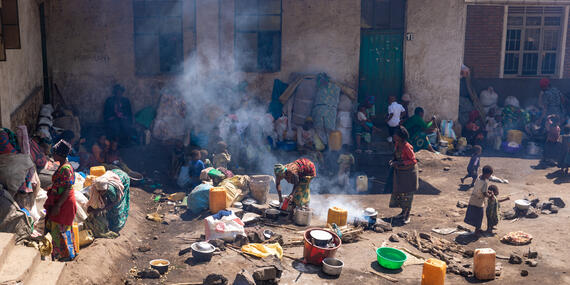
Text and photos by Wassy Kambale in Kinshasa, DRC
"Every day, new boats drop off dozens of families on our beach," says Amzat Mwezi, chief of Kitembo village in Minova, in the Democratic Republic of the Congo (DRC).
He is referring to the unexpected arrival of more than 120,000 people since February, due to an outbreak of armed clashes in neighbouring North Kivu Province. But their arrival brings a new threat to the region: cholera.
Amzat explains: "Displaced people arrive with nothing. They have a crucial need for drinking water, food and shelter. But we have no water points; people have no other choice than to take water directly from the lake."
This is why Minova, a cholera endemic area in DRC’s South Kivu Province, is experiencing a resurgence of the disease, which is caused by consuming contaminated food or water. The number of cases has increased significantly, from six per week in early January to 40 per week by mid-March. Health sources in Minova reported 279 cases and one death between January and March.
Cholera can be particularly deadly for children under age 5. In places with poor sanitation, such as Minova, the stools of infected people can contaminate water, which can then transmit the disease to others.
Minova needs an immediate and robust cholera response to prevent cholera escalating rapidly. But the area is now isolated and difficult to access due to flooding, landslides and armed groups, all of which is severely challenging humanitarians’ response efforts.
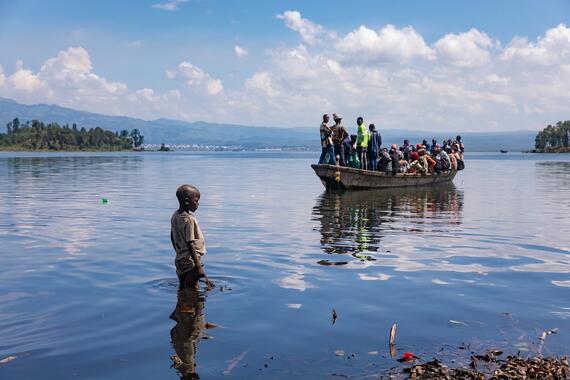
The threat of cholera looms
In more than 60 sites and collective centres hosting displaced families in Minova, hygiene conditions are disastrous, and overcrowding increases the risk of cholera spreading.
One of those sites is a primary school that now hosts more than 8,000 people all crammed into the school’s grounds. The families sleep on the floor, and each morning they must remove their belongings from the classrooms before the school day begins.
Lulihoshi, 28, lives in this school with her three children. Her husband was killed in early February as the family fled fighting in their village, Karuba, in North Kivu. She trekked for two days with her children to reach Minova.
"I don't even know if he was buried," she confides.
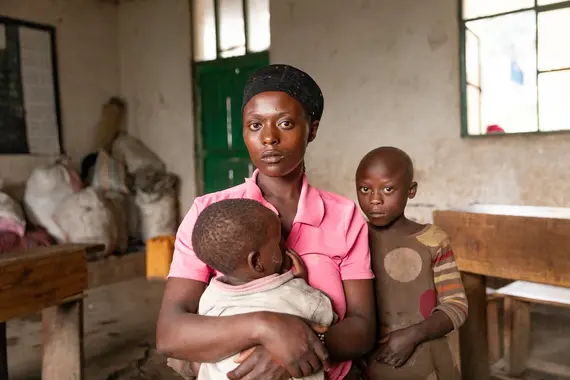
Lulihoshi has no idea what food they will manage to get each day, and she is even more concerned by the sanitary conditions they live in. The school’s 12 toilets cannot accommodate everyone. Every evening, displaced people line up to access them.
"Even if we have no food, we should at least have toilets. We already have so many problems, a cholera outbreak would be too much for us," she says.
A race against time
Entire families sleep crammed into schools, churches or makeshift shelters. Food is becoming scarce. Women and children are particularly vulnerable and exposed to sexual violence and recruitment by local armed groups.
Faced with the magnitude of the crisis, local authorities and humanitarian actors have created a local crisis committee to monitor the humanitarian situation each day.
Jean Paul Kanku, a Minova elder and head of the crisis committee, explained:
"A few humanitarian partners are providing aid with very limited capacity. An urgent and massive response could sustainably bridge the gap."
Non-governmental organizations (NGOs) such as AIDES, Medair and Médecins Sans Frontières, as well as UN agencies such as UNICEF and the World Health Organization, are deploying teams to support the emergency response. This includes setting up safe water distribution points, cholera treatment centres and awareness-raising activities.
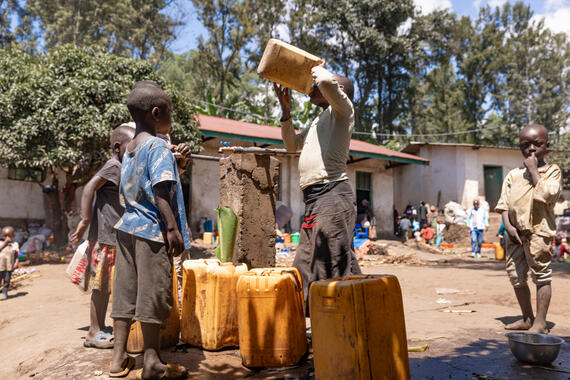
At the Minova General Hospital, nurse Faraja Bahati is busy at the bedside of patients.
He explains: "Since the beginning of the year, we have received 45 patients, most of them are children. Without awareness-raising in the community, the number would have been higher now.”
Thanks to the efforts of humanitarians and local health workers, the number of cases in the area decreased at the end of March. But health staff remain cautious.
Working around the clock
Urbain Balekezi works for AIDES, monitoring cholera activities in the area.
He explains:
"We no longer have weekends. Cholera is not like other diseases. Normally we only have 48 hours to intervene, but with the influx of displaced people, we must react within 24 hours to break the transmission chain."
If left untreated, cholera can kill a healthy person within just a few hours. Every morning, an AIDES team visits Minova’s health facilities to check the patient register and take note of new admissions.
As soon as the health-care staff confirm a case of cholera, the team goes to the community to decontaminate the patient’s household, as well as 15 to 20 households nearby. The patient is then isolated in a cholera treatment unit. The care, supported by humanitarian organizations, is free and includes nutritional support, as most patients are displaced and do not have access to sufficient food.
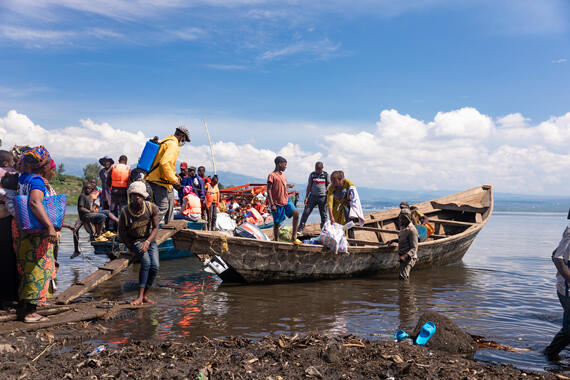
Isolation makes everything more difficult
In addition to the deteriorating context, Minova is now isolated. The road connecting Minova to Bukavu, the capital of South Kivu Province, is impassable due to flooding and landslides, and the road connecting Minova to Goma, the capital of North Kivu, is under embargo by an armed group.
As a result, medical supplies and medicines now take more than three days to arrive, instead of just a few hours.
The battle against cholera is in full swing in Minova. But given the magnitude of the task and challenges on the ground and the dwindling resources, how long can humanitarian organizations continue to support people in need?
*This story was originally published in OCHA exposure.
